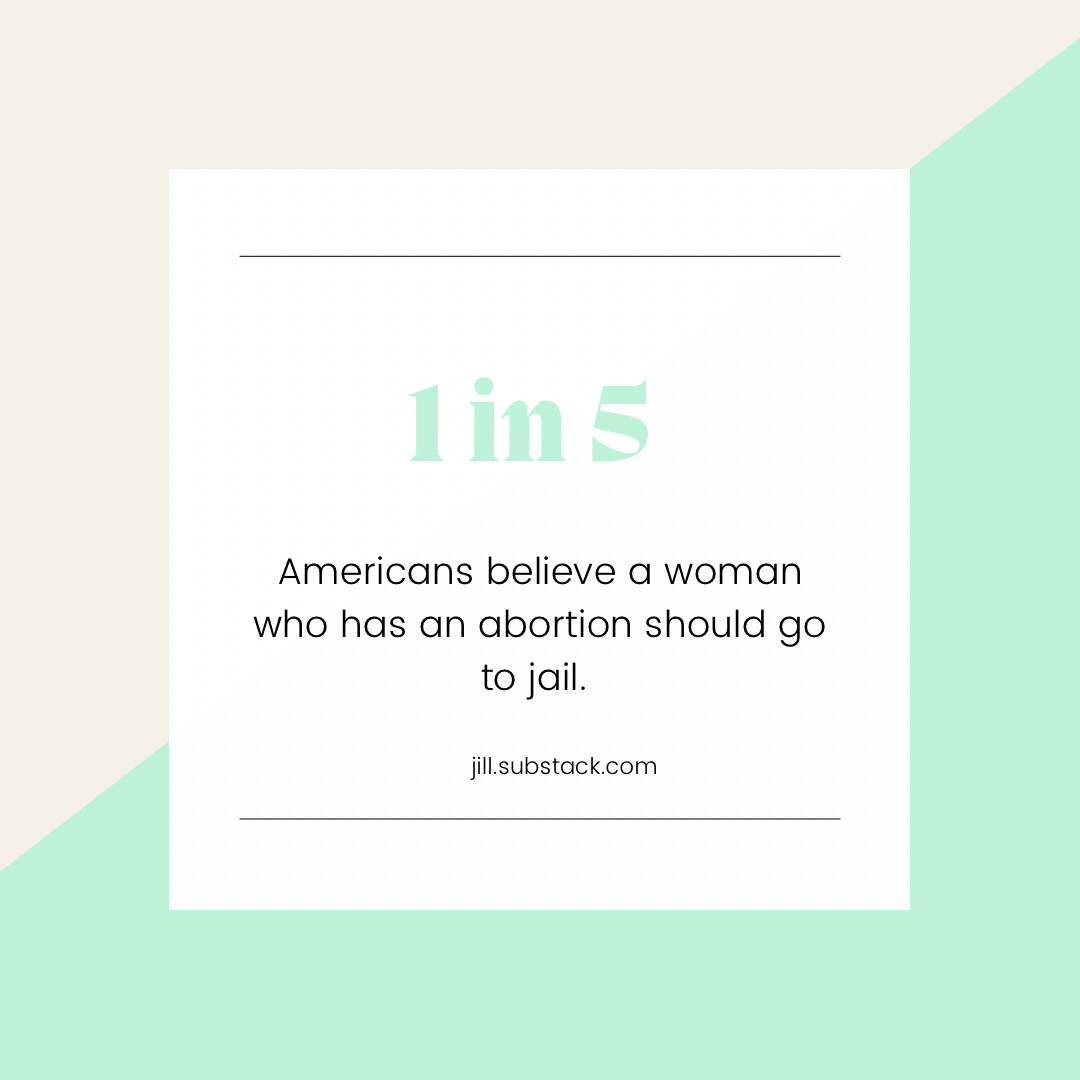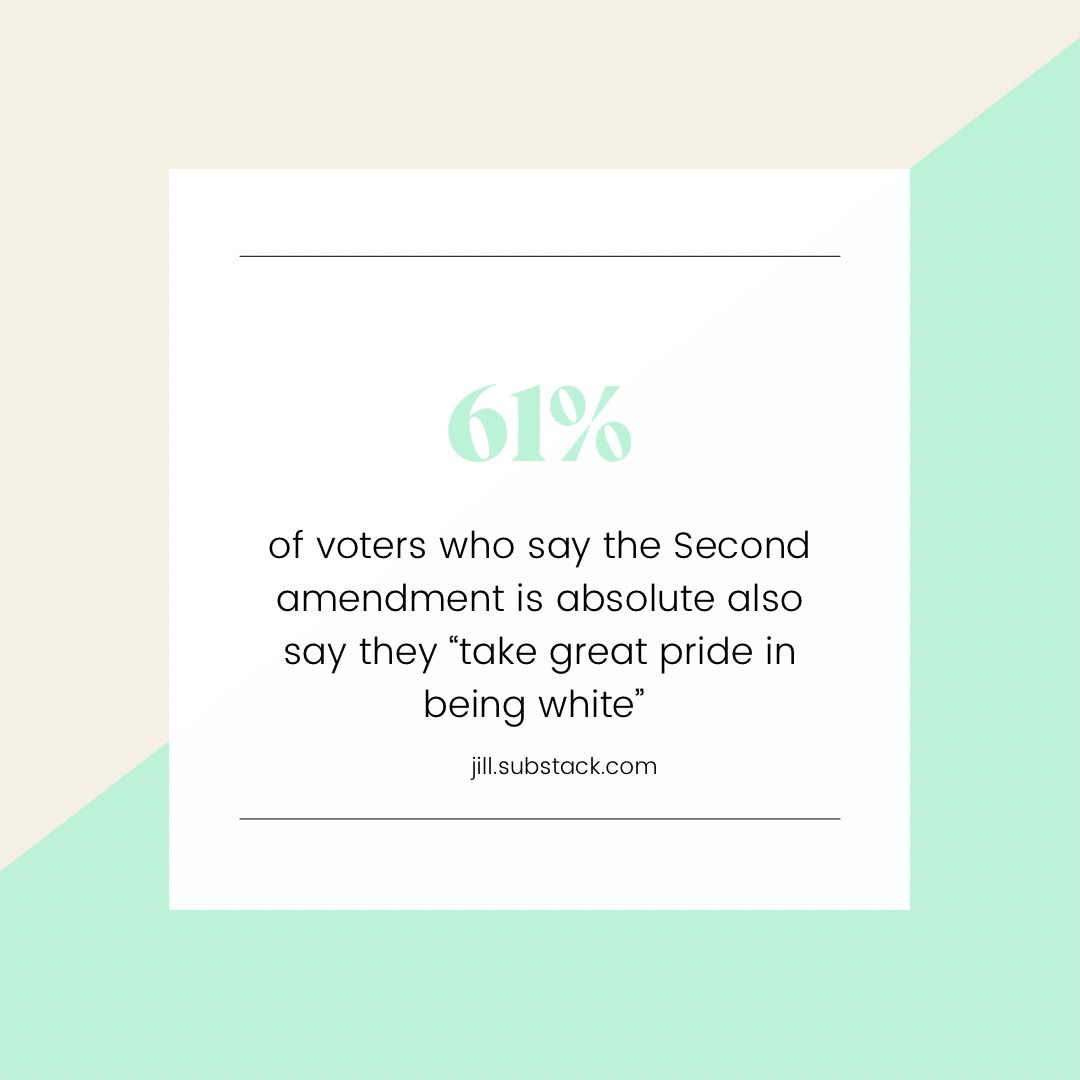Hello readers, and welcome to the Week in Women! I’m also testing out a new addition this week, which is The Week in Numbers — statistics and data that relate to the women’s rights news of the week, as well as what I’ve been writing about in the newsletter.
You’ll find some social-media-friendly images that capture these stats — feel free to copy and share. Curious to hear your thoughts on this new addition.
And a quick note: THANK YOU to those of you who signed up for a paid subscription during my holiday subscription drive, and had the 20% you saved dedicated to abortion rights groups. I just got the final numbers, and you raised more than $800 for abortion rights. That money is going to the Brigid Alliance, which helps women in the US travel for abortion care, and Women Help Women, which helps women all over the world access contraception, abortion pills, and reproductive health information, wherever they live.
The Week in Numbers
A rundown of the stats, polling, and data that tell us a little bit more about what’s in the news, and in this newsletter, this week.
63%: The number of Americans who agree that, if it’s safe and effective, people should have the option to manage their abortion at home outside of the traditional health care system. 33% strongly agree. [PerryUndem]
62%: The number of Americans who agree with the statement, “I’d support women getting access to abortion pills outside of the traditional health care system if their state bans abortion.” 34% strongly agree. [PerryUndem].
Related reading: Americans are Really Confused About Medication Abortion.
18: The percentage-point gap between men who have political ambitions and women who have political ambitions. While some 60% of men say they’ve considered running for office, some 60% of women say they have not considered running — and despite record numbers of women running for office, this gender gap has actually grown larger in 20 years. [Brookings]
30%: The number of voters of reproductive age who say they plan to have children (or more children) in the future. 53% say that they would want to have children (or more children) in an ideal world, and men are more likely to both plan to have children and say they would have them (or have more of them) in an ideal world. [PerryUndem]
61% vs. 33%: The number of men vs. women in the US who believe women have equal job opportunities. [Gallup]
Related reading: An Ambitious Woman After the End of Ambition.
One in Five: The number of Americans who believe a woman should go to jail for having an abortion. [Kaiser Family Foundation]
61%: Of the minority of voters who believe the right to arms is absolute (32% of all voters), the proportion who “take a great deal of pride in being white.” [PerryUndem].
Related reading: What’s the Matter with (right-wing) Men?
Chart of the Week:
Source: PerryUndem
The Week in Women
Here’s what’s been going on in women’s rights news around the world:
Florida Men tracking the periods of teenage girls: The Florida High School Athletics Association’s new draft physical education evaluation form is requiring high school student athletes to disclose their menstruation history, including the age of their first period, how many days are typically between their periods, and the date of their last period. Making this question, which was once optional, a requirement is part of an attack on transgender youth that is happening throughout the state — and, abortion rights advocates worry, a tool for monitoring possible pregnancy and enforcing the criminalization of abortion.
Abortion Wins in Minn: The Governor of Minnesota signed a bill enshrining the right to abortion into state law. The Protect Reproductive Options (PRO) Act establishes that “every individual has a fundamental right to make autonomous decisions about the individual’s own reproductive health.” The state legislature is considering other bills to protect abortion rights, including legislation to repeal medically unnecessary restrictions that a district court declared unconstitutional last year.
Biden Expands Contraception Coverage: The Biden Administration unveiled a proposal aiming to expand access to contraception under the Affordable Care Act. The proposal reverses a Trump-era rule that allowed employers to refuse contraceptive coverage on moral grounds. It would also enable individuals enrolled in plans offered by employers with religious objections to obtain contraception at no cost directly from a willing provider. The proposed rules will be published in the Federal Register later this week and will be open for comments for 60 days before they are finalized.
Attempted Murder of an Iranian Feminist: The US Department of Justice revealed details in the case of an attempted assassination of Iranian-American journalist and human rights activist, Masih Alinejad at her Brooklyn home last year. The three men now in custody were part of an Iranian-backed murder for hire group and all had ties to Iran and Eastern European gangs.
Gender Equality in the Danish Military: Denmark is planning for mandatory enlistment for women into the country’s military. The move was announced after NATO criticized the country for its defense shortcomings, in an effort to increase the size of its armed forces. The Danish Defense Minister said that more women would be beneficial to the military.
Utah Targets Trans Youth: The Republican governor of Utah signed a bill into a law that bans youth from receiving gender-affirming care, including prohibiting transgender surgery for young people and children and also bans hormone treatments for minors that have not been diagnosed with gender dysphoria. At least 18 other states are considering similar anti-LGBTQ laws that specifically target transgender youth.
Women’s World Cup, Sponsored by Visit Saudi? Australia and New Zealand, which are hosting the Women’s World Cup, have asked FIFA not to accept Saudi Arabia’s tourism arm as a sponsorship partner, noting the country’s harsh misogynist laws.
GOP Homophobes: Republican state lawmakers have been pushing a wave of anti-LGBTQ legislation at the start of legislative sessions in the new year. In particular, the legislation targets transgender people, including proposed bans on transition care into young adulthood, restrictions on drag shows, and requirements for teachers and schools on gender identity. More than 150 anti-LGBTQ bills have been introduced in 25 states in January alone.
Women Targeted in Myanmar: Investigative research found that women in Myanmar who have expressed anti-military views on social media have been subjected to online violence and abuse, including threats of violence, calls for their arrest, doxxing, and rape and death threats by pro-military users. Advocates called out Facebook and Telegram for not responding quickly enough to these threats and not doing enough to tackle this rampant issue in Myanmar.
Bitter Anniversary: Thousands of activists gathered in dozens of US cities to commemorate the 50th anniversary of Roe v. Wade and in protest of the Supreme Court’s decision to overturn the constitutional right to abortion. About 200 protests were scheduled in 46 states.
Abortion Opponents Gloat: Anti-abortion protestors rallied in DC for the 50th annual “March for Life” in the first major event since Roe was overturned. Speakers spoke about how their fight is far from done and called for even more abortion restrictions in the states.
Getting More Cameroonian Women in Power: Women’s rights activists in Cameroon have been pushing for more women to run for Senate races ahead of a registration deadline at the end of January. Currently only 26 members of the 100 member senate are women, and activists want to see this number doubled.
Exceptions to Abortion Bans Don’t Work: Abortion bans in several states make exceptions in narrow circumstances, usually to save the life and/or health of the pregnant person, or in the case of rape or incest. However, a New York Times investigation found that very few exceptions to the bans have actually been granted. In several states with exceptions, most have reported close to zero abortions since the bans were enacted.
Equality in Sierra Leone: Sierra Leone’s President signed into law landmark gender equality legislation that will work to reduce barrier to women’s political participation in the country. Under the new law, political parties’ candidate lists for parliamentary and local elections must be made up of 30% women candidates. Currently, only 12% of Sierra Leone’s parliament is made up of women.
…and that’s it for now. Happy weekend, readers.
xx Jill
The Week in Women comes to you thanks to research from Tamar Eisen (she/her/hers), an advocate for reproductive justice and gender equity. She lives in New York City and works for the Center for Reproductive Rights.









Really loved this week in numbers!